The Owl House: A Children’s Show with a Bisexual, Hispanic Lead!
In ‘The Owl House’ protagonist Luz Noceda stumbles across a portal to another dimension where magic exists, called The Boiling Isles.
Incluvie Foundation Gala - Learn More


Stories centering on girlhood and boyhood are a familiar staple of the television landscape. You would be hard-pressed to find someone who can’t name a coming-of-age story highlighting a young person’s journey figuring out how the world works and finding their place within it. First Day follows Hannah Bradford, a 12-year-old girl navigating the transition between Primary School and High School, exploring the ups and downs of childhood and growing up. However, Hannah also happens to be transgender. Not only is she experiencing the transition between schools, but she also deals with the unique challenges that come with being a trans kid — and is determined to find a sense of belonging while embracing her authentic self.
The Australian series, written and directed by Julie Kalceff, boasts well-deserved accolades including a 2021 International Emmy Kids Award and a GLAAD award for Outstanding Kids and Family Programming. First Day is a significant stride for representation in children’s television. Though the show is occasionally intense — as far as children’s programming goes — and draws attention to some critical issues, that doesn’t stop it from being thoroughly entertaining.
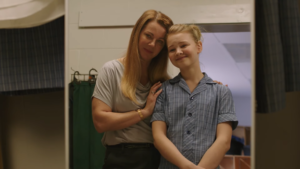
First Day consists of four episodes, each around twenty minutes long. The story begins on Hannah’s final day of primary school, where she is still known by the name given to her at birth and is still wearing the boy’s uniform. However, the bulk of the story takes place in Hannah’s high school as she attends for the first time presenting as her authentic self. Eager to fit in and just live her life, Hannah hopes to keep her trans identity private and only share this information with the people she trusts most.
First Day provides a rare glimpse into the realm of trans girlhood, a lived experience that the TV world shies away from. In many ways, Hannah’s life looks pretty average. Like many girls, Hannah has hobbies including Taekwondo, playing video games with her brother, and hanging out with her friends. However, she also has struggles that differ from her peers, like being prevented from going to sleepovers due to safety concerns and the nerve-wracking experience of coming out to friends.
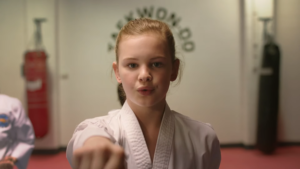
Considering the show is intended for children, I particularly appreciate how it deals with sensitive topics. It does not neglect showing cisgender children the reality of their transgender peers like deadnaming, bullying, and even losing friends after coming out. However, the show also makes plenty of room to highlight the strength and resilience of transgender children and takes plenty of opportunities to highlight moments of joy and displays of acceptance. Essentially, the script is rooted in reality. First Day distances itself from the media’s affinity with trans trauma porn. Conversely, it’s not neglecting the struggles that trans kids face in today’s world. Though this may not seem like a notable achievement, considering how sensationalized the portrayals of trans women had been ever since their introduction in film and television, I think that this should be celebrated whenever we see it.
The characters are also well written. Even though the show centers around Hannah and her experiences, there is enough depth in the other characters that you will still find yourself caring about them. Hannah’s parents, particularly her mother, are just trying their best to make sure that their daughter is safe and happy. Hannah’s teacher, Ms. Fraser, is reminiscent of the teachers that we all loved in high school and secretly wanted to be friends with (Or was that just me?). And Hannah’s friends, Nat and Olivia, are arguably an essential component to making the show what it is. They display the kindness that is at the core of this show’s message. They may not always understand their friend’s struggles, and they may not always say the right thing, but they’re just trying their best to understand an experience that they don’t know much about.
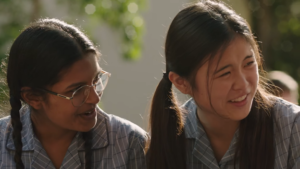
The lead role of Hannah is eloquently played by Evie Macdonald. As a transgender actor herself, Macdonald’s performance is as authentic as it is powerful; it is a true testament to why casting trans people to play trans roles is the best move. The pain, the joy and every emotion in between feel genuine. One prime example is a scene in the first episode. With summer coming to a close, and the anxiety of the impending school year beginning to mount Hannah opens up to her mother about her fears of starting school for the first time presenting as the girl she is. Macdonald’s performance is so moving that it broke my heart, and I’m sure that if you’re a sentient being it’ll break yours too. Looking at the show as a whole, Hannah’s development from that insecure kid into the bold, self-assured person she is in later episodes is successfully portrayed in a way that feels natural and realistic; it makes me excited to see where she’ll go next.
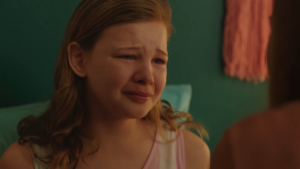
Another character that deserves some attention is Isabella. Put plainly, Isabella is a bully. However, the combination of truthful writing and the performance by actor Isabel Burmester lends to the character’s complexity. Isabella is not a total monster. Is she horrible? Yes. However, she’s complicated. For instance, we see her at times questioning her hurtful behaviour in subtle but vital ways. Isabella isn’t simply a one-dimension, fictional supervillain we have all imagined our bullies to be. Though not a great person, she is human and could easily be someone we know. Her character growth is refreshing to witness, especially after watching children’s shows featuring one-dimensional mean girls for most of my childhood. Though her development between her two final scenes may seem a little sudden, it’s a significant moment for children to witness because some kids and even some adults are like Isabella (Yeah, you know who you are). So, for the people who see themselves in this character, it’s good for them to know that they can grow and choose to be kind, irrespective of how they may have acted in the past.
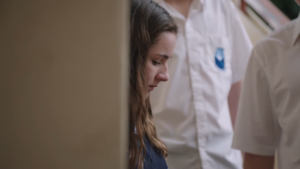
While I wish the series explored more issues that did not center around Hannah’s transness, given that the series is four episodes long, I understand why there wasn’t much time to explore other topics thoroughly. Though, with season 2 on the horizon, perhaps the series will take the opportunity to explore other issues not related to Hannah’s gender identity. We can only wait and see.
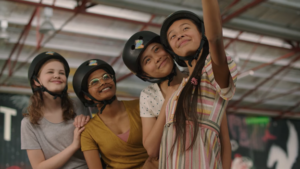
I’d be lying if I said I’ve only watched the series once. Though I am an adult woman, it was refreshing to see a new take on stories about girlhood. Queer and trans children are widely erased from the media landscape and even more so in children’s television. All in all, First Day is a rallying cry for kindness, teaching children about an experience that is often hidden from them. And the show also shows transgender children that they are not alone, there are people going through the same things they are and that there are people that will stand by their side even when things get tough. Ultimately, I believe this show signifies a new era of TV where LGBTQIA+ children can be represented in media as they deserve to be. An era of TV that can encourage all children to show up as their most authentic selves.
-Chelsea Hill